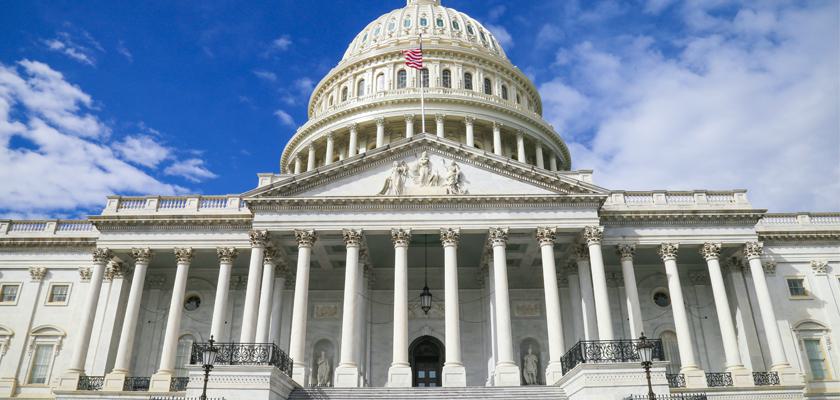Congressmen Gary Palmer (R-AL06) and Barry Moore (R-AL02) both voted against the Creating Helpful Incentives to Produce Semiconductors (CHIPS-Plus) Act in the U.S. House of Representatives on Thursday. They both released statements afterward explaining that their opposition is due to the size of the spending bill, that it subsidizes certain industries, and that it is loaded with woke policy initiatives.
“This $280 billion unpaid-for bill is a wasted opportunity to combat aggression by the Chinese Communist Party (CCP) and ignores the record levels of inflation American families are facing,” said Palmer. “While pandemic supply chain issues showed us how important it is to have more semiconductors built here in the United States, this bill is another example of special interests using legislation to promote their own financial benefit at the expense of American families.”
“In the midst of our highest inflation rate in more than 40 years, this legislation spends $250 billion on crony capitalist handouts with no guardrails to prevent that money from strengthening China’s economy instead of our own," said Moore. "We all share the goal of revitalizing the critical semiconductor industry, but I cannot vote for legislation that adds $79 billion to the deficit without proper oversight or assurances of accomplishing its stated purpose.”
U.S. Sen. Richard Shelby (R-Alabama) voted against the bill when it passed the Senate on Wednesday.
“Today I voted against the CHIPS Act because I will not support legislation that uses hard-earned taxpayer dollars to provide corporate welfare to massive, profitable companies,” Shelby said on Twitter. “These companies can afford to expand on their own. They do not need subsidizing.”
The COVID-19 pandemic and resulting supply chain shortage revealed just how dependent the United States is on semiconductors (computer chips) made in China and Taiwan – an independent island nation that China claims as their territory. A Chinese invasion of Taiwan could result in a massive shortage of chips needed for America’s defense, communications, automotive, and related industries.
Congresswoman Terri Sewell’s (D-AL07) office explained in a prepared statement that a nationwide shortage of semiconductor chips has severely disrupted American manufacturing, slowing down production, spiking prices and increasing dependence on unfriendly foreign nations. Only 12% of semiconductor chips are currently manufactured domestically—a dramatic drop from 37% in the 1990s—while foreign competitors are investing heavily to dominate this critical national security industry. Other nations have also begun to outpace the United States’ research advantage, threatening American preeminence in technology and scientific innovation.
“The threat posed by the CCP is real and simply throwing money at large corporations will not solve the problem,” Palmer said. “Congress needs to confront the current semiconductor shortage by reducing regulations that prevent companies from procuring resources domestically and creating a tax system that doesn’t penalize capital investment.
“Once again, on another critical issue, the Democrats in Congress have failed the American people."
“If we truly want to boost the American economy and decrease our dangerous dependence on foreign technology, energy and supply chains, the answer is reducing taxes and regulations for all American industries and families, not crony capitalism,” Moore said.
Rep. Sewell voted in favor of the CHIPS Act.
“The CHIPS and Science Act is a victory for Alabama and our nation!” said Sewell. “This major legislation is all about ensuring that America remains a world leader in science, technology, and innovation. By turbocharging our production of semiconductors, the CHIPS and Science Act will strengthen American manufacturing, lower costs, and bolster our independence from foreign suppliers, all while creating good-paying jobs here at home. I’m also thrilled that this bill will bring research investments to our local communities to help diversify our STEM workforce. I look forward to seeing President Biden sign it into law!”
Moore’s office explained that after failed conference negotiations on an American competitiveness package to confront China, the Senate amended H.R. 4346 to send billions of taxpayer dollars in subsidies and tax credits to a specific industry that Moore’s office said does not need additional government handouts. While acknowledging the threat China poses to American industrial supply chains, this corporate welfare bill will not effectively address that challenge. At a time when Democrats’ spending policies have led to historically high inflation, the government should not be injecting hundreds of billions of dollars in additional subsidies into the economy. This legislation comes to the House precisely as Senate Democrats have allegedly struck a deal on their partisan reconciliation bill, pairing up a tone-deaf agenda that on one hand gives billions away in corporate handouts, and on the other hand undoes historic tax cuts implemented by Republicans. The partisan Democrat agenda has given us record inflation, and now they are poised to send our country into a crushing recession.
CBO estimates that CHIPS-Plus increases the deficit by $79.3 billion over the years 2022 to 2031. Specifically, Division A would increase direct spending by $51.9 billion (CHIPS for America Fund and Wireless Supply Chain Innovation) and decrease revenues by $24.3 billion (25 percent Advanced Manufacturing Refundable Investment Credit) over the next ten years.
The Alabama Policy Institute’s Justin Bogie told 1819 News, “The Congressional Budget Office also came out with its new long-term budget outlook yesterday. It doesn't paint a pretty picture of what's to come if we continue on the same course.”
President Joe Biden is expected to sign the legislation into law.
To connect with the author of this story, or to comment, email brandon.moseley@1819News.com.
Don’t miss out! Subscribe to our newsletter and get our top stories every weekday morning.










